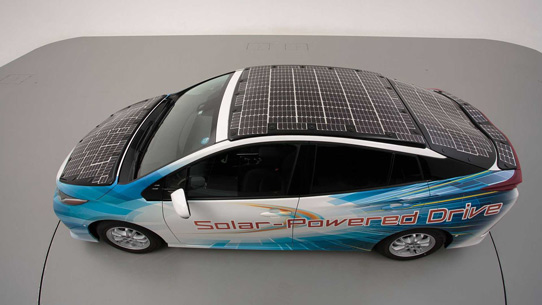- News
16 July 2019
NEDO, Sharp and Toyota to begin public road trials of electric vehicles with high-efficiency solar cells
The Japan National Research and Development Agency’s New Energy and Industrial Technology Development Organization (NEDO), Sharp Corp and Toyota Motor Corp plan to begin public road trials from late July that aim to assess the effectiveness of improvements in cruising range and fuel efficiency of electric vehicles (EVs) equipped with high-efficiency solar cells.
To facilitate execution of the trial, Sharp has modularized its triple-junction compound semiconductor solar cells (which have a conversion efficiency of 34%-plus, based on cell output measured by Sharp under AM1.5G standard test conditions), previously developed for a NEDO-led project, in order to create an onboard solar panel. Since the solar cell comprises a thin film about 0.03mm in thickness, it can be install efficiently to fit the curves of parts with limited space, including the vehicle roof, hood, rear hatch door and other parts of Toyota’s Prius PHV, and hence a demo car was produced for public road trials.

By enhancing the solar panel’s efficiency and expanding its onboard area (utilizing several solar cells), Toyota achieved a rated power generation output of about 860W (total module output based on calculation of cell output, as measured by Sharp), which is about 4.8-times higher than the 180W for the commercial model Prius PHV (equipped with a solar charging system with solar cell conversion efficiency of 22.5%).
Also unlike the commercial Prius PHV (which charged the driving battery only while parked), due to the improvements in power output the demo car employs a system that charges the driving battery also while being driven. This is expected to lead to significantly improved battery electric vehicle (BEV)-mode cruising range (rising from 6.1km to 44.5km for charging when parked per day, or 56.3km when also being driven).
Toyota plans to conduct the trials under various driving conditions in Toyota City, Aichi Prefecture, Tokyo, and other areas. Various data (including power output of the solar panel and how much the drive battery is charged) will be obtained and verified, and then used in the development of an onboard solar recharging system.
Toyota plans to share a selection of trial data results with NEDO and Sharp. The PV-powered Vehicle Strategy Committee (established in April 2016), sponsored by NEDO and other entities, will evaluate the benefits based on improvements in CO2 emission reduction and convenience (e.g. the number of times a vehicle requires recharging). The goal is to contribute to creating a new solar panel market (including the transport sector) and to finding solutions for energy and environmental issues in the transport sector.
GaAs PV Multi-junction solar cells


